By:
- Yadira Galindo
Published Date
By:
- Yadira Galindo
Share This:
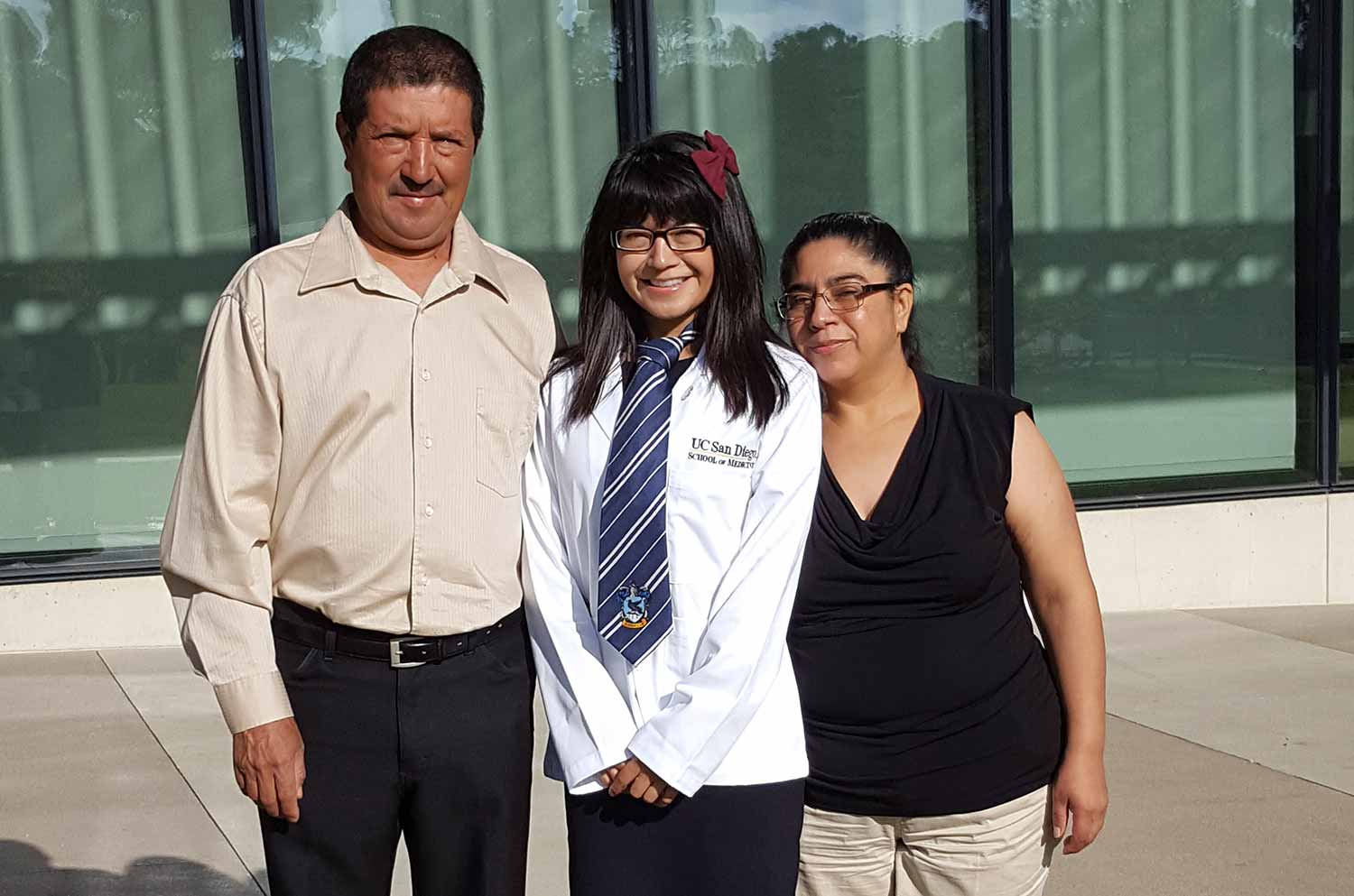
A first-generation college student, Maribel Patiño attributes her successful university career to a strong support system. Here, she is pictured with her parents, Esteban and Amalia, at the White Coats Ceremony at which medical students are fitted with their first white physician’s coat.
A Career Cultivated in Watermelon Fields
Standout student who found her calling while working in agriculture awarded Paul & Daisy Soros Fellowship for New Americans
Like many high school teenagers, Maribel Patiño elected to take an unconventional summer job to supplement her family’s income. Growing up in Lamont, Calif., a farming community located 13 miles from downtown Bakersfield, Patiño decided to follow her two older siblings and their parents to work in the fields to harvest watermelons.
“Maribel asked to be given a chance to work in the fields placing produce stickers on the watermelon,” remembers Esteban Patiño, Maribel’s father. “There she was, happy to be with us in 100-degree weather. It’s one of the most difficult jobs in the farm fields because of the heat, summer rains and the weight of the watermelons. We would process 2,000 to 3,000 watermelons per day.”
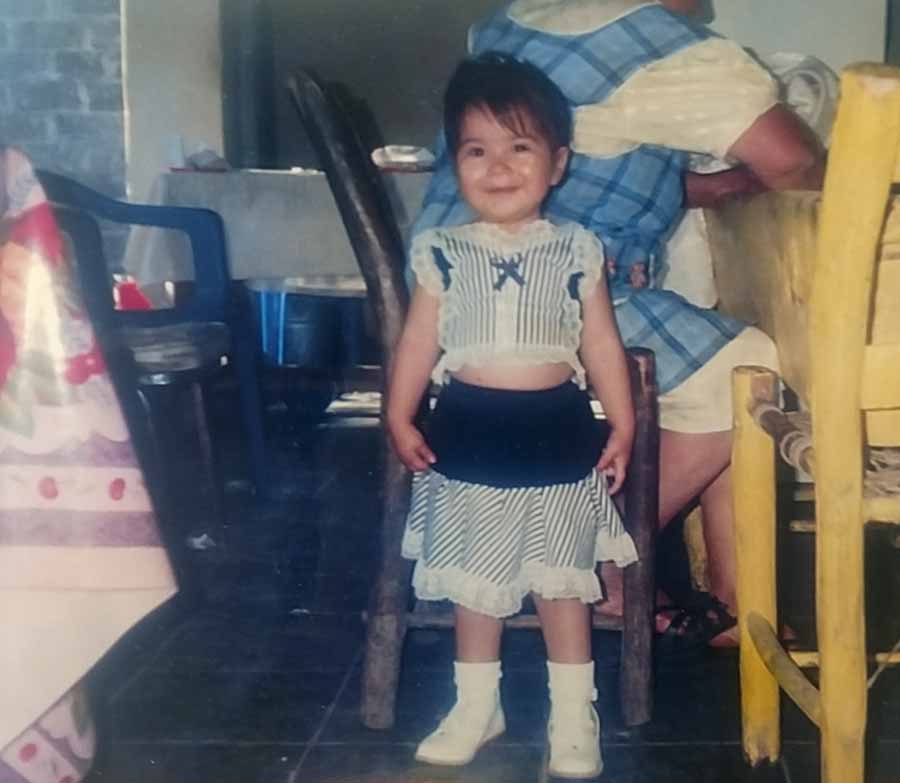
Despite attending low-performing elementary and middle schools, Patiño exceled in high school and has earned numerous awards and accolades while pursuing higher education, including a Paul & Daisy Soros Fellowship for New Americans.
On her first day as a farm laborer, Maribel began to see the adverse health effects of agricultural labor. Men, women, and even young people like her succumbed to dehydration. A few required hospitalization after suffering from heatstroke. This became a common occurrence.
“I saw a lot of health issues tied to being a farmworker, such as pesticide exposure, heatstroke, and skin damage," Patiño said. “However, most people are unaware that many farmworkers risk their health to keep our country fed. Experiencing these harsh working conditions firsthand and learning that agricultural work creates a multitude of health issues for a vulnerable community that simultaneously faces large hurdles in accessing healthcare motivated me to pursue a career in medicine.”
Ten years later, Patiño is in her fourth year of UC San Diego School of Medicine’s Medical Scientist Training Program in which she is concurrently working toward both an M.D. and Ph.D. in neuroscience. She is conducting her thesis research at the Salk Institute for Biological Studies in the lab of Edward Callaway, who is also adjunct professor in the Department of Neurosciences at UC San Diego. Patiño’s research involves improving and developing molecular and genetic neurotechnology that can be used to help attain a detailed understanding of brain structure and circuit function necessary to improving how we treat, prevent, and cure diseases of the brain.
Her accomplishments recently caught the eye of The Paul & Daisy Soros Fellowships for New Americans program, which awarded her a $90,000 graduate school fellowship for outstanding immigrants and children of immigrants in the United States. She has been named a fellow in the class of 2020, an honor previously bestowed to former United States Surgeon General Vivek Murthy, California Surgeon General Nadine Burke-Harris and UC San Diego professors Lei Liang and Dr. Jona Hattangadi-Gluth.
“Growing up, I never thought I was going to be a doctor. I definitely didn’t think to be a physician-scientist. I didn’t even know what that was,” said Patiño. “The prospect of doing research came later when I was an undergrad. That’s when I was exposed to additional limitations of medicine. Many times, inadequate healthcare is a result of systemic healthcare disparities such as inadequate access to physicians and medications. But sometimes it is lack of basic scientific information or translational research that hinders the medical community’s ability to provide effective treatment and improve patients’ lives."
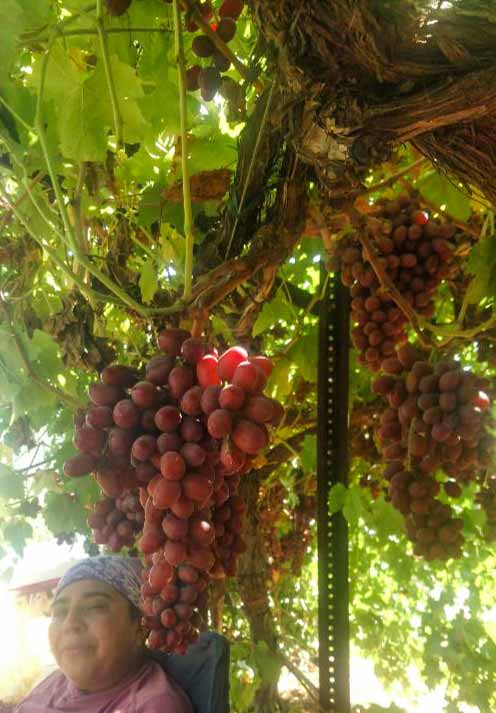
Patiño spent summers working in watermelon fields. Her father and mother (pictured here in a grape field), continue to work in agriculture in Lamont, Calif.
After high school, Patiño enrolled at the University of California Berkeley, where she majored in molecular and cell biology with an emphasis in neurobiology. For her honors thesis, she studied the relationship between traumatic brain injury and epilepsy. She then went on to work at the University of Pennsylvania through the National Institutes of Health Post-Baccalaureate Research Education Program, studying the role of a repeat expansion mutation in the development of neurodegenerative diseases.
At UC San Diego, Patiño has two more years of graduate school and two more years of medical school to complete the eight-year Medical Scientist Training Program. When she graduates, she wants to lead her own lab to delve into neurological and psychiatric diseases at the basic science level. She hopes to help expose the networks and circuits that lead to brain disorders. She also plans to work directly with patients in the clinical setting.
“Patients and their stories are what lead and guide your research,” she said.
Growing up, it was Patiño’s parents who guided her. In Mexico, her parents had limited access to education but they insisted that their children study. And when it was time to visit universities, they were right there with her.
“Despite that she came from parents with only an elementary school education, we wanted her to achieve more,” said Maribel’s mother, Amalia Patiño. “My husband and I never left our children alone. He would work mornings and arrive early and I would work evenings, so that there was always someone to encourage them and attend school functions. From preschool through college, we never missed one graduation. We are extremely proud of what Maribel has accomplished to date, as well as her dedication to her studies and to getting ahead in life.”
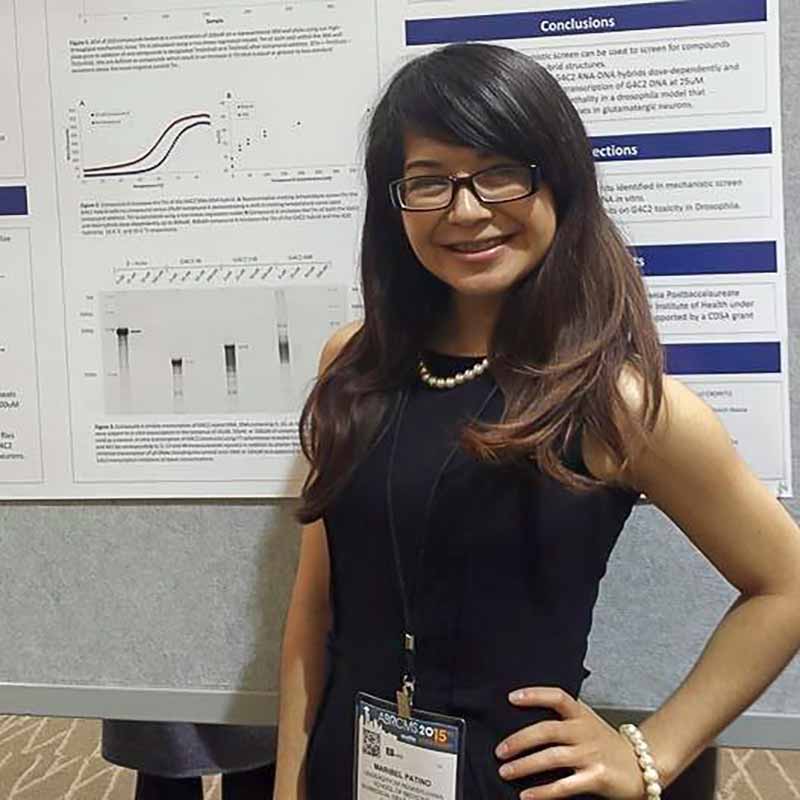
When she graduates, Patiño dreams of leading her own lab to delve into neurological and psychiatric diseases at the basic science level. She believes the best way to help patients is to understand the networks and circuits that lead to brain disorders.
Things could have been very different for Patiño. She attended one of the lowest performing elementary and middle schools in her school district. Ninety five percent of the student body was on free and reduced lunch. While in high school, counselors advised that she limit enrollment in Advanced Placement (AP) classes and extracurricular activities because they were more concerned about dropout rates than getting students to pursue higher education.
Patiño’s high school class started 600 strong; less than half graduated. Of those, only about 10 students attended a four-year university. Classmates who performed incredibly well in AP classes did not necessarily pursue higher education because they lacked the means or the support system.
Social and cultural disparities were against her at every turn. Patiño considers herself lucky. Somehow, she found the right mentors and had the support of her parents to follow her dreams.
“I was in the right place at the right time,” she said. “The social support was there for me. Every step along the way, I met people who helped me. If I wouldn’t have met them, I would not be here today. For a lot of people, the support isn’t there. Some people had to work in the fields full time. I only worked in the summers. There are so many obstacles. Sometimes, it’s not about how hard you work but rather whether the right support is present.”
That’s why, while pursuing her M.D./Ph.D. degree, Patiño and classmates at UC San Diego founded Colors of the Brain, a program run by graduate students to provide mentorship and resources to underrepresented minority students who are interested in STEM careers and want to apply to graduate school.
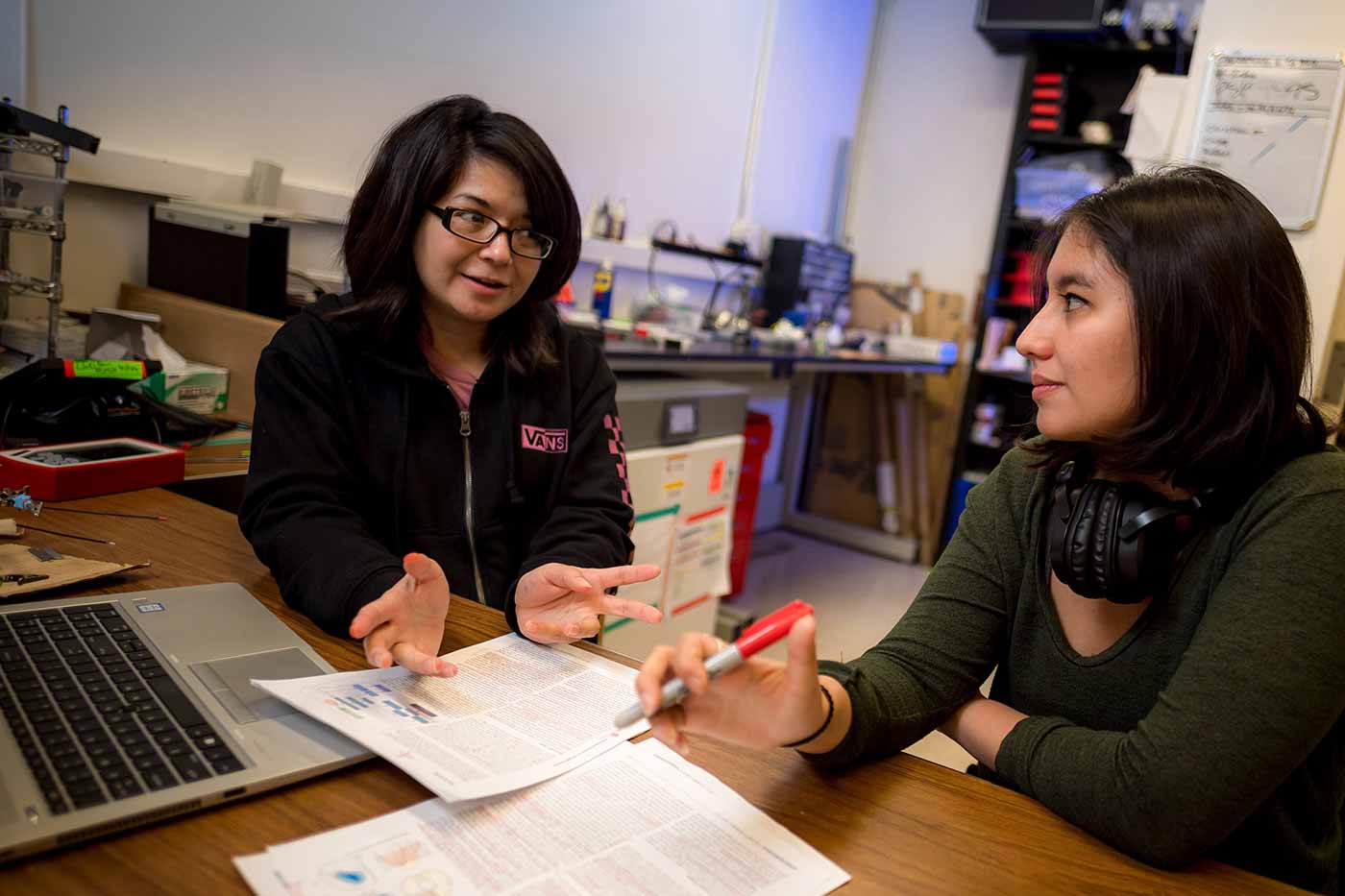
Patiño knows there are many obstacles for first-generation college students and immigrants to succeed in higher education. That’s why she and classmates at UC San Diego formed Colors of the Brain, to provide guidance to students who need help navigating the path that she has walked from the fields of Lamont to the campus at UC San Diego.
“Being a first-generation immigrant, I would often think that I did not have the qualifications to apply for a scholarship, grant, or fellowship,” Patiño said. “When I was at Berkeley, I initially applied for many and didn’t get most of them. It was very difficult for me to get my first fellowship.”
Colors of the Brain is Patiño's way of helping UC San Diego students who have followed a path like hers. And the Soros fellowship is an opportunity for her to interact with professionals and find new mentors who have similar beginnings to hers.
“What is special and different about the Paul & Daisy Soros Fellowships for New Americans is that it encompasses all disciplines. What ties us together are our immigrant stories,” said Patiño. “We get outside of our small fields and meet professionals in many disciplines like law and music.”
The fields of her youth, where her parents continue to pick watermelons and other produce, is not a dream job for most teenagers. Hours of squatting and bending over the fruit to place produce stickers was arduous work. The job helped put food on the table, but it also planted an ambitious goal in a curious and determined mind. A mind cultivated by mentors and parents to reach beyond the boundaries of the fields of Lamont.
The application for the 2021 Soros Fellowship is now open and due on October 29, 2020.
Share This:
You May Also Like
Stay in the Know
Keep up with all the latest from UC San Diego. Subscribe to the newsletter today.



